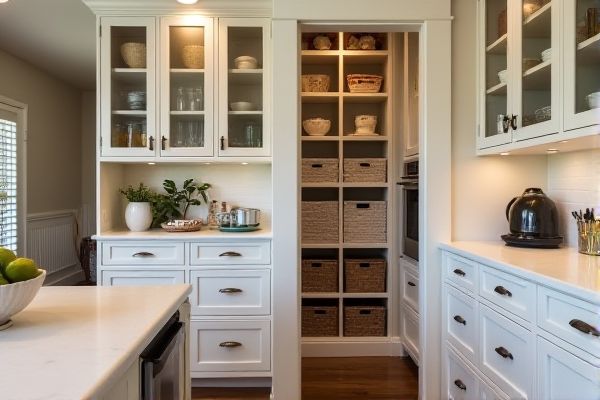
Open cubbies in a pantry offer quick visibility and easy access to items, helping you stay organized by allowing you to spot supplies instantly. Closed cubbies provide a cleaner look and protect contents from dust and pests, making them ideal for storing less frequently used or sensitive items; explore the rest of the article to discover which pantry cubby style best suits your kitchen needs.
Table of Comparison
| Feature | Open Cubbies | Closed Cubbies (Pantry) |
|---|---|---|
| Visibility | Full visibility of items, easy to find | Items hidden, reduces visual clutter |
| Dust & Cleanliness | Exposed to dust, requires frequent cleaning | Protected from dust, easier to maintain |
| Organization | Requires careful arrangement for neatness | Allows better compartmentalized storage |
| Aesthetic | Opens up space, modern look | Cleaner, streamlined appearance |
| Accessibility | Quick access to pantry items | May need to open door, slight delay |
| Protection from pests | Less protection, open to pests | Better protection, enclosed space |
| Cost | Generally lower cost to install | Typically higher cost due to doors & hinges |
Introduction: Why Pantry Organization Matters
Pantry organization enhances kitchen efficiency by ensuring quick access to ingredients and reducing food waste. Open cubbies offer visibility and easy retrieval, ideal for frequently used items, while closed cubbies protect contents from dust and pests, maintaining freshness. Choosing the right pantry style depends on balancing accessibility with cleanliness to optimize storage and meal preparation.
Open Cubbies: Definition and Key Features
Open cubbies in pantries are storage compartments without doors, offering easy visibility and quick access to items like jars, canned goods, and kitchen essentials. Their key features include increased air circulation, customizable shelf sizes, and contributing to a more open, airy kitchen aesthetic. You can optimize pantry organization by selecting open cubbies for frequently used items, enhancing efficiency and accessibility.
Closed Cubbies: Definition and Key Features
Closed cubbies in a pantry refer to enclosed storage compartments with doors or drawers that conceal contents, offering a clean and organized appearance. These cubbies protect food items from dust, pests, and moisture, maintaining freshness and hygiene. Your pantry benefits from closed cubbies by maximizing space efficiency and reducing visual clutter while keeping essentials easily accessible.
Visual Appeal: Aesthetics of Open vs Closed Cubbies
Open cubbies in a pantry create a visually appealing, airy, and organized look by displaying items neatly and making everything easily accessible. Closed cubbies offer a sleek, minimalist aesthetic by concealing clutter and maintaining a clean, uniform appearance that suits modern or traditional kitchen designs. Your choice depends on whether you prioritize a decorative display or a streamlined, tidy environment.
Accessibility and Convenience Comparison
Open cubbies in a pantry offer immediate visibility and quick access to items, enhancing convenience for daily use and reducing the time spent searching for ingredients. Closed cubbies, while potentially less accessible due to doors or panels, help maintain a tidy appearance and protect contents from dust and pests, supporting cleanliness and organization. Your choice depends on whether you prioritize easy reach and quick identification or prefer a neater, more protected storage solution.
Storage Capacity and Space Optimization
Open cubbies in a pantry maximize visual access and make it easier to find items quickly, but they often limit storage capacity due to lack of enclosed shelving for stacking. Closed cubbies provide better space optimization by allowing you to store items in a more organized, secure manner with adjustable shelves, increasing overall storage density. Your choice between open and closed cubbies should consider how much accessible storage space you need versus the benefit of easy visibility and quick access.
Cleanliness and Maintenance Requirements
Open cubbies in a pantry tend to accumulate dust and crumbs more quickly, requiring frequent cleaning to maintain cleanliness. Closed cubbies offer protection against dirt and pests, reducing maintenance needs and preserving food freshness. Your choice between open and closed cubbies impacts how often you must clean and manage pantry organization.
Cost Considerations: Budgeting for Your Pantry
Open cubbies typically cost less due to simpler construction and fewer materials, making them a budget-friendly choice for your pantry. Closed cubbies, featuring doors and hardware, increase costs but offer better protection from dust and a tidier appearance. Prioritizing your budget can help determine whether you invest in the affordability of open storage or the added functionality and aesthetics of closed pantry cubbies.
Style Compatibility with Home Designs
Open cubbies in pantry designs enhance a modern or rustic aesthetic by showcasing neatly organized items, making them ideal for contemporary, farmhouse, or industrial-style kitchens. Closed cubbies offer a sleek, minimalist look that complements traditional, transitional, or modern homes by concealing clutter and maintaining clean lines. Selecting between open and closed cubbies depends on the desired balance between visual accessibility and streamlined design coherence.
Making the Right Choice: Factors to Consider
Open cubbies in pantries offer quick access and visibility, ideal for frequently used items and enhancing kitchen organization. Closed cubbies provide a cleaner look, protecting contents from dust and maintaining privacy, which is beneficial for long-term storage or less attractive kitchenware. Consider kitchen size, usage frequency, and aesthetic preferences when deciding between open and closed pantry cubbies.
 homyna.com
homyna.com